For the 2025 school year, there is 1 public preschool serving 387 students in Clay County Schools School District.
Public Preschools in Clay County Schools School District have a diversity score of 0.28, which is less than the North Carolina public preschool average of 0.72.
Minority enrollment is 16% of the student body (majority Hispanic), which is less than the North Carolina public preschool average of 59% (majority Black and Hispanic).
Overview
This School District
This State (NC)
# Schools
4 Schools
994 Schools
# Students
1,301 Students
464,055 Students
# Teachers
91 Teachers
33,275 Teachers
Student : Teacher Ratio
14:1
14:1
District Rank
Clay County Schools School District, which is ranked within the top 30% of all 320 school districts in North Carolina (based off of combined math and reading proficiency testing data) for the 2021-2022 school year.
The school district's graduation rate of 75-79% has decreased from 85-89% over five school years.
Overall District Rank
#97 out of 325 school districts
(Top 30%)
(Top 30%)
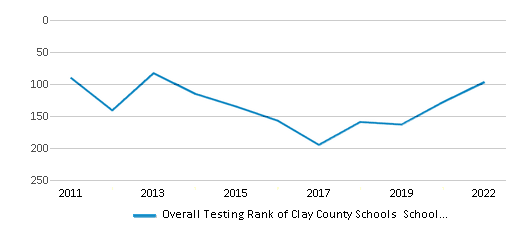
Math Test Scores (% Proficient)
60%
51%
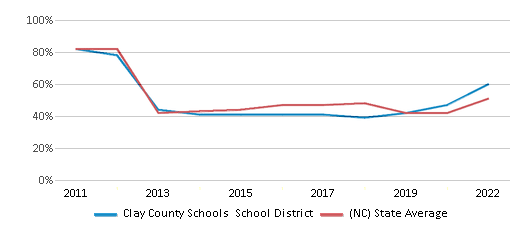
Reading/Language Arts Test Scores (% Proficient)
55%
50%
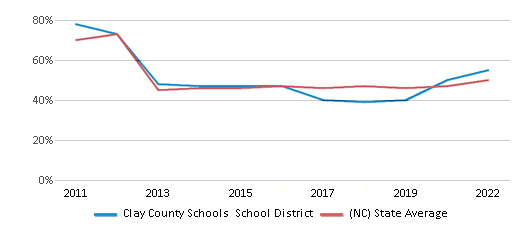
Science Test Scores (% Proficient)
68%
63%
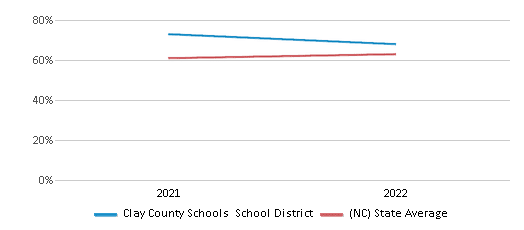
Graduation Rate
75-79%
86%
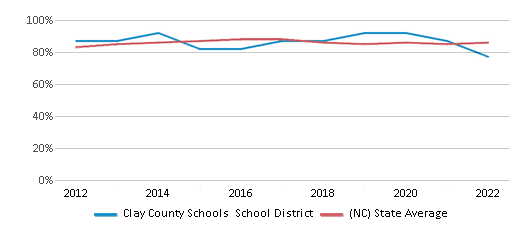
Students by Ethnicity:
Diversity Score
0.26
0.72
# American Indian Students
7 Students
6,572 Students
% American Indian Students
1%
1%
# Asian Students
3 Students
18,458 Students
% Asian Students
n/a
4%
# Hispanic Students
119 Students
105,943 Students
% Hispanic Students
9%
23%
# Black Students
7 Students
114,509 Students
% Black Students
1%
25%
# White Students
1,111 Students
189,147 Students
% White Students
85%
41%
# Hawaiian Students
1 Student
648 Students
% Hawaiian Students
n/a
n/a
# Two or more races Students
53 Students
28,778 Students
% of Two or more races Students
4%
6%
Students by Grade:
# Students in PK Grade:
72
23,104
# Students in K Grade:
98
72,144
# Students in 1st Grade:
105
74,289
# Students in 2nd Grade:
112
75,942
# Students in 3rd Grade:
78
68,925
# Students in 4th Grade:
79
69,686
# Students in 5th Grade:
100
66,668
# Students in 6th Grade:
100
5,021
# Students in 7th Grade:
93
3,684
# Students in 8th Grade:
90
3,629
# Students in 9th Grade:
97
214
# Students in 10th Grade:
114
194
# Students in 11th Grade:
78
187
# Students in 12th Grade:
85
368
# Ungraded Students:
-
-
District Revenue and Spending
The revenue/student of $12,883 is higher than the state median of $11,187. The school district revenue/student has stayed relatively flat over four school years.
The school district's spending/student of $12,477 is higher than the state median of $11,612. The school district spending/student has stayed relatively flat over four school years.
Total Revenue
$17 MM
$17,307 MM
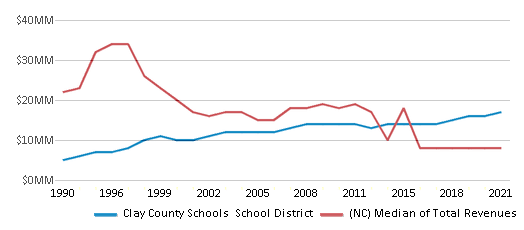
Spending
$16 MM
$17,964 MM
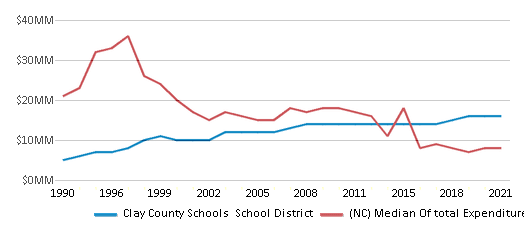
Revenue / Student
$12,883
$11,187
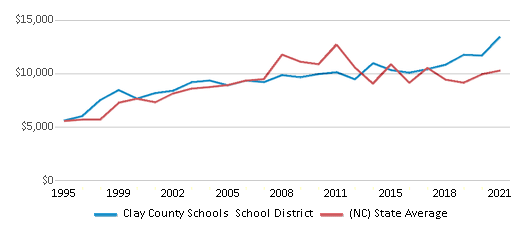
Spending / Student
$12,477
$11,612
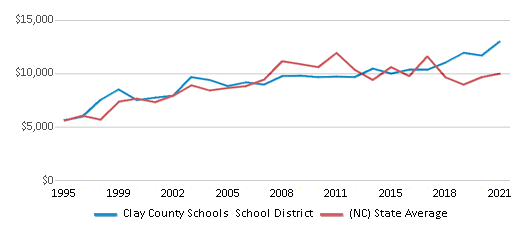
Best Clay County Schools School District Public Preschools (2025)
School
(Math and Reading Proficiency)
(Math and Reading Proficiency)
Location
Grades
Students
Rank: n/an/a
698 Anderson St
Hayesville, NC 28904
(828) 389-3763
Hayesville, NC 28904
(828) 389-3763
Grades: PK-2
| 387 students
Recent Articles

What Is A Charter School?
Explore the world of charter schools in this comprehensive guide. Learn about their history, how they operate, and the pros and cons of this educational innovation. Discover key facts about charter schools, including admission policies, demographics, and funding, as well as what to look for when considering a charter school for your child.

10 Reasons Why High School Sports Benefit Students
Discover the 10 compelling reasons why high school sports are beneficial for students. This comprehensive article explores how athletics enhance academic performance, foster personal growth, and develop crucial life skills. From improved fitness and time management to leadership development and community representation, learn why participating in high school sports can be a game-changer for students' overall success and well-being.

February 05, 2025
Understanding the U.S. Department of Education: Structure, Impact, and EvolutionWe explore how the Department of Education shapes American education, from its cabinet-level leadership to its impact on millions of students, written for general audiences seeking clarity on this vital institution.





